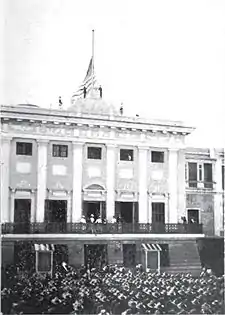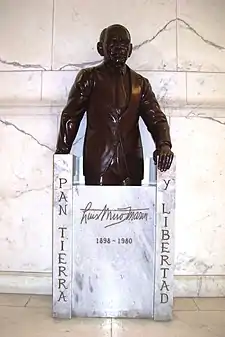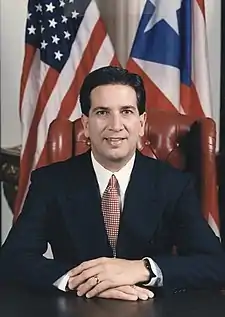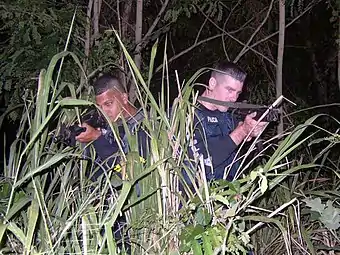Crime in Puerto Rico
Puerto Rico has struggled with crime for decades since the island became a United States territory in 1898. Police and political corruption in particular have posed problems ever since. The significant trade of illegal drugs in Puerto Rico poses a recurrent problem, with the high prices of substances such as cocaine on the territory's streets causing large profit margins for criminals despite government actions.[1]
| Puerto Rico | |
|---|---|
| Crime rates* (2011) | |
| Violent crimes | |
| Homicide | 30.6 |
| Rape | 1.9 |
| Robbery | 174.4 |
| Aggravated assault | 78.1 |
| Property crimes | |
| Burglary | 447.6 |
| Larceny-theft | 789.7 |
| Motor vehicle theft | 157.9 |
Notes *Number of reported crimes per 100,000 population. *Compare with U.S. cities Source: FBI - Uniform Crime Reporting - Crime in the United States 2011 (Table 5) | |
Violent crime has also been one of the challenges the island has struggled with for years. For example, in the mid-2000s, the territory ranked sixth worldwide in murders per capita.[2] In reaction to those statistics, organizations such as the U.S. Coast Guard and the Drug Enforcement Administration (DEA) have enhanced efforts with the Puerto Rico Police Department (PRPD) and other local agencies, with the former larger groups having a major presence on the island. The combination of this fortified presence and other local measures has sparked commentary about a fundamental militarization of the police.[2][3] The U.S. Department of Justice Civil Rights Division, for instance, cautioned in 2011 that the PRPD was "broken in a number of critical and fundamental respects."[4]
The island's strategic geographic position further compounds its struggles with crime. As the island finds itself between a highly developed country—the continental United States—and various developing nations in the Caribbean, a unique economic and political situation arises that heightens the stakes on maintaining both domestic and regional security. Moreover, as the region evolved after the end of the Cold War, issues such as illegal migration and drug trafficking extended beyond local law enforcement to become matters affecting regional stability.[3]
To combat all these issues, the Puerto Rican government adopted a broad anti-crime policy referred to locally as the "iron fist" (Spanish: mano dura contra el crimen or simply mano dura).[1][2] In 1993, Governor Pedro Rosselló summed up government efforts by remarking, "They have incited a war, and they'll get it: let criminals know that our patience is gone" (Spanish: Nos han pedido guerra y guerra tendrán. Que lo sepa el criminal: nuestra paciencia se acabó.).[1] Even after adopting multiple measures, however, the territory has still suffered from significantly high per capita rates of violent crime. For example, a total of 736 individuals were murdered in Puerto Rico in 2006.[5]
Background and early history
Puerto Rican crime before the 1980s

The history of Puerto Rico as a colony under the Spanish Empire came to an end near the conclusion of the 19th century. As a part of the Spanish–American War, the U.S. invaded the island with a landing at Guánica on July 25, 1898. The Puerto Rican Campaign resulted in a total defeat for Spanish armed forces. U.S. troops led by Nelson A. Miles experienced only seven deaths, yet they took control over the entire island in a matter of weeks. As an outcome of the war and the comprehensive American victory, the nation of Spain ceded Puerto Rico as well as the territories of Guam and the Philippines held under Spanish sovereignty to the U.S., the 1898 Treaty of Paris establishing the peace. Spain gave up all rights to Cuba as well.[6][7]
The Americanization of Puerto Rico started after this abrupt, violent change in government, with initial chaos holding back the military-led reorganization of civil society.[7][8] Major General Guy V. Henry, who served as military governor of the island from 1898 to 1899, publicly remarked on the changing situation, "It was an entirely new duty for American Army officers." He added, "There was no precedent in the experience of those so suddenly placed in charge of this our first real colony, upon which their policy could be based." In terms of fighting crime after the transition, Henry commented that the local "police is made up of young men of good family" and praised its decisions that "proves its efficiency". More generally, Henry described the Puerto Rican people as "an amiable and intelligent" group that were "not disloyal", though labeling them as "childlike" as well and arguing for suffrage to be restricted to certain property owners.[8]
The island possessed approximately one million residents at that time. The aftermath of the Puerto Rican campaign notably included a 1917 measure affirming Puerto Ricans as legal U.S. citizens. Resistance to such assimilation on the island failed to significantly slow down the process.[7] As an unincorporated U.S. territory, the Constitution of the U.S. and edifice of federal law has applied to multiple aspects of life in Puerto Rico from participation in Social Security to use of the U.S. Postal Service.[9]
Migration to and from Puerto Rico initially took place in a social environment known as colonia. Widespread industrialization spread across the continental U.S. throughout the early part of the 20th century while such development efforts didn't occur on the island in a large scale until the 1940s. That fact, coupled with the citizenship status granted to Puerto Ricans, caused widespread movement after the island fell under American control, particularly with individuals going to major U.S. metropolises. This unfortunately led to the spread of crime related to immigrant neighborhoods as well. Estimates in 1933 found that over 1,500 criminals had recently purchased false Puerto Rican birth certificates, using them to enter New York. During the Great Depression, the negative cultural stereotype associating working-class Puerto Ricans with the record highs in New York City's crime rates brought out pervasive discrimination and prejudice.[10]

In the aftermath of World War II, a conflict in which many native Puerto Ricans fought, the U.S. federal government enacted multiple measures in partnership with local personnel under the title of Operation Bootstrap to finally transform the island into a developed economy. However, despite considerable advances the territory struggled in fighting deeply-rooted problems. Pervasive unemployment in multiple areas remained a difficult challenge.[10] Still, the island's general growth took place in an atmosphere of relatively low criminality— especially in terms of violent crime, with police efforts focused more on matters such as clandestine rum production than the likes of bank robberies. The first modern such robbery didn't take place until after the 1950s ended.[3]
Enactment of the controversial "war on drugs" that various agencies at different levels of the U.S. government have put into force, not just on the continental U.S. but elsewhere, has served as a major inflection point in Puerto Rican history. The territory's government has struggled to combat the illegal drug trade and the resulting crime since the mid-1970s, with increasing law enforcement efforts over multiple decades contributing to a cycle of violence in which both demand and supply of illegal substances remain considerable.[3][11]
Though recreational drug use was uncommon in Puerto Rico in the 1950s, it had markedly increased in the 1960s. By the following decade, said increase in usage, particularly among those under the age of 25, became a major concern in Puerto Rican society. Estimates found that up to seventy thousand islanders were substance abusers.[3] A number of drug cartels discovered that Puerto Rico functioned as an efficient transfer point while trafficking contraband such as cocaine to the mainland United States, and that location of opportunity proved a magnet for organized crime over decade after decade.[2][3][11]
A major focus on crime and, specifically, drug-related problems arose in Puerto Rican politics out of those events. A 1975 survey found that 87% of respondents believed that violence had recently increased to a serious extent. Beside mentioning "vice", however, inflation and lack of employment attracted notice as causes of Puerto Rican crime as well.[3]
Puerto Rican crime since the 1980s
The existence of apparent 'no man's land' areas, in which all manner of criminal activity could take place without any sort of police control, among particularly lower-class communities caused widespread concern. The use of automatic weapons and other arms to directly fight back against law enforcement became a particular problem as well. From 1993 to 1996, the government confiscated a total of 10,017 illegal firearms during their efforts. As well, the total number of murders in Puerto Rico nearly doubled from 1987 to 1994— increasing from 509 to 995, respectively. These trends received massive interest in the island's news media.[3]
Perceptions about widespread crime triggered political turmoil and sustained pressure for the authorities to change their approaches, often involving a doubling-down of anti-drug crackdowns.[3] In the early 1990s, notably, law enforcement began specifically targeting white collar drug users. A government chief of staff remarked that the police had witnessed "housewives who go to these [drug distribution] spots with their children in the car" and vowed to send a strong message.[12]

The broad, strict approach of the island's government has been known as the "iron fist" (Spanish: mano dura contra el crimen or simply mano dura).[1][2] In 1993, Governor Pedro Rosselló summed up government efforts by remarking, "They have incited a war, and they'll get it: let criminals know that our patience is gone" (Spanish: Nos han pedido guerra y guerra tendrán. Que lo sepa el criminal: nuestra paciencia se acabó.). During the first month of that year alone, a total of 104 murders took place. Specific changes in the anti-crime efforts have included assigning police officers with more weapons and targeted intervention of the National Guard in certain places.[1]
However, Puerto Rican efforts generally proved inadequate in stopping widespread drug trafficking in the latter part of the 20th century. The government had not just expanded employment levels and general funding for jailing and policing but also undergone a kind of militarization in its organization. Specific strategies included longer sentences for criminals, increased funding for officer equipment, and the construction of new prisons. From 1992 to 1998, the island's budget for policing approximately doubled. Yet progress remained mostly elusive.[1][2][3] Public opinion viewed the island's law enforcement situation in critical terms. In 1997, a major national poll found that a 68% majority believed that crime had gotten "much worse" over the previous five years.[3]
In response to pervasive crime, local law enforcement attempted to integrate their efforts with U.S. federal agencies, especially with fighting trafficking in mind. The U.S. Coast Guard and Drug Enforcement Administration (DEA)[13] both reinforced their presence on the island during the 1990s, setting up connections that remained years later.[2][3] Nonetheless, challenges such as police corruption have frequently complicated matters as different groups attempt to work with each other. The Puerto Rico Police Department (PRPD), the territory's primary law enforcement agency, has been tarnished by multiple scandals over officer misconduct up to and including outright criminal activity.[4][5][14][15]
For example, one of the biggest law enforcement corruption busts in U.S. history took place in 2001 on the island. Twenty-nine police officers were caught on videotape drug trafficking thanks to an undercover operation initiated by the Federal Bureau of Investigation (FBI). Coming after authorities suspected local police of direct involvement in drug dealing, some officers even being bold enough to sell heroin from their squad cars, the bust additionally aimed to stop the illicit protection provided to certain cocaine dealers who shipped their contraband throughout the island. Known as Operation Lost Honor, a total of thirty-two individuals were arrested in the case.[5][15] Orlando Sentinel journalist Ivan Roman stated that the bust "stunned a department already reeling from a series of" previous scandals.[15]
As well, four Puerto Rican officers were arrested in 2008 by the FBI, including the director of the island's Extradition Division, for extortion as well as the distribution of both cocaine and heroin. The EFE World News Service stated in a report that the arrested "took advantage of the authority of their uniforms".[14] Between 1993 and 2000, the PRPD kicked out a full one thousand officers due to a variety of criminal charges. Between 2003 and 2007, a hundred officers had been under investigation, with seventy-five others convicted under the jurisdiction of the U.S. federal court system.[5]
Then Police Superintendent Pedro Toledo said in 2007, "We have had officers using police cars to escort drug dealers, and we have arrested officers selling weapons to undercover agents". He stressed that many officers did their best even while some had chosen to "violate their oath". The previous year, the violent death of trafficking kingpin Jose "Coquito" Lopez Rosario had spawned an investigation into the upper levels of the territory's government. The late kingpin's ties to three local senators extended to the point that one of the officials had brought him along during prison inspections.[5]

The massive bust on Puerto Rican soil as a result of Operation Guard Shack generated international media coverage, with publications such as the American CNN and the British Daily Telegraph reporting on it.[16][17] The culmination of a two-year FBI investigation into law enforcement corruption in the territory, the operation came to a head on October 6, 2010 with a series of pre-dawn raids. These led to over a hundred arrests, with those taken in including members of the PRPD, the Puerto Rico Corrections Department (PRCD), and even U.S. Army soldiers. The corrupt individuals had gone beyond providing security for drug traffickers to actively taking part in the deals. Officials charged a total of 133 individuals in the operation.[16][18]
The operation began at 3 a.m. as sixty-five tactical groups spread across the territory, with Hostage Rescue Teams (HRT) and Special Weapons and Tactics Teams (SWAT) making the surprise arrests. Over one thousand agents of the FBI, many of them flown into the island secretly, conducted the massive raid. The organization labeled the operation as "likely the largest police corruption case in the FBI's history."[18] "The people of Puerto Rico deserve better," stated then U.S. Attorney General Eric Holder.[16]
Causes of police corruption include the relatively low wages paid to regular officers. Then Police Association President Jose Rodriguez reported in 2007 that Puerto Ricans patrolling the streets made about twenty-six thousand dollars a year. Rodriguez additionally pointed out how local sergeants supervised thirty to thirty-five officers— in contrast to the average of ten in the continental U.S.[5]
Puerto Rico's murder rate dropped somewhat from the 1990s into the 2000s, yet violent crime remained significantly higher not just at a regional but also on an international scale. In the mid-2000s, the territory's troubles ranked it sixth worldwide in murders per capita.[2] In 2006, a total of 736 individuals were murdered in Puerto Rico.[5]
In terms of the 2010s, the cycle of violence between criminals and law enforcement remained a severe challenge as conditions on the island evolved.[19][20] A 2011 report by the Civil Rights Division of the U.S. Department of Justice into the Puerto Rican police concluded that the department was "broken in a number of critical and fundamental respects". While stating that many "hard working and dedicated" officers "serve the public with distinction under often challenging conditions", the investigators declared that the violations "uncovered are pervasive and plague all levels of" the department.[4] At the conclusion of that year, Puerto Rico's experienced a spike in violent crime, with over a thousand people having been killed.[19][20]
The Puerto Rican debt crisis of the mid-2010s has challenged the territory's civil society and resulted in hundreds of thousands of residents becoming unemployed. A subsequent wave of migration to the mainland from the island took place as well. A U.S. federal oversight board agreed to supervise the local government's financial administration in 2016, with some $74 billion of debt on the line. A Miami Herald article from 2017 stated that the crisis has left Puerto Rican "institutions in shambles".[20]
.jpg.webp)
The aftermath of 2017's Hurricane Maria, which devastated the island, created worries of yet another uptick in dangerous crime. Scarcity of basic resources as multiple areas go without electric power for days and days, relying on diesel-powered generators to get by, increased the feelings of fear. In the first eleven days of 2018, thirty-two individuals died after criminal attacks. During a weekend in December 2018, there were seven killings.[21] The extent to which such violence will cycle as the rebuilding takes place remains uncertain.[19] Police Superintendent Hector Pesquera remarked in 2017 that the territory's crime problem had been mostly "out of sight, out of mind" to mainland Americans before the hurricane and no longer was.[20]
Nonetheless, individuals such as former Police Superintendent Miguel Pereira have observed that the large profit margins associated with illegal drugs in Puerto Rico, the high demand being driven by multiple social problems, will foster criminal acts no matter what law enforcement tries to do. Pereira provided a specific example in 2013 with how cocaine sold for about $15,000 a kilo on Puerto Rican streets while wholesale producer in areas of Colombia produced the substance for only $400 per kilo or so. Thus, Pereira publicly lamented, criminals could even lose a full 90% of their supply through anti-drug efforts and still receive significant returns; for instance, a mobster cleaned out of all but 100 of his initial 1,000 kilos could still manage to become a millionaire from those leftovers alone.[1]
Debates and discussions
Commentators that have questioned the effectiveness of government anti-crime policy altogether include Gary Gutierrez, a criminal justice professor at the University of Turabo,[19] and Jorge Rodriguez Beruff,[2] an academic and historian associated with the University of Puerto Rico (UPR).
In 2013, the former secretary of the Puerto Rico Department of Corrections and Rehabilitation Zoé Laboy remarked publicly that "in general terms we have failed" (Spanish: en términos generales hemos fracasado) while arguing that some initiatives had resulted in good outcomes.[1]
In the aftermath of 2017's Hurricane Maria, Miami Herald journalist David Ovalle wrote,
[T]he future for law enforcement on the island is bleak. The department has lost about 4,000 officers in the past five years and, because of the island's economic crisis, cannot count on fresh recruits anytime soon. Hundreds of U.S. Army soldiers, outside law-enforcement officers and private security guards are helping— temporarily— but robberies, murders and drug dealing have resumed at levels that would seem outrageous in mainland states but are tragically normal here.[20]
In 2018, Puerto Rican social activists began a renewed push for statehood status in the atmosphere of increased post-hurricane media attention.[22] The effects that closer ties and direct governmental integration between the island and the mainland would bring, particularly in terms of crime and social stability in general, are uncertain. Past efforts in favor of statehood by political figures such as U.S. Presidents Ronald Reagan and George H. W. Bush have previously amounted to relatively little.
In film and song
Crime in Puerto Rico was featured in a film and accompanying soundtrack by Daddy Yankee called Talento de Barrio. The soundtrack has had four singles released off of it: "Pose", "Somos de Calle", "¿Qué Tengo Que Hacer?", and "Llamado de Emergencia".
See also
References
- "Evidente el fracaso de la "Mano Dura" contra el crimen" (in Spanish). El Nuevo Dia. March 14, 2013. Retrieved September 2, 2018.
- Eileen, Rosin; Youngers, Coletta, eds. (2005). Drugs and democracy in Latin America: The impact of U.S. policy. Lynne Rienner Publishers. pp. 324–328. ISBN 9781588262547.
- Griffith, Ivelaw L., ed. (2000). The political economy of drugs in the Caribbean. Palgrave Macmillan. pp. 162–179. ISBN 9780230288966.
- "Investigation of the Puerto Rico Police Department" (PDF). Justice.gov. September 5, 2011. Retrieved January 18, 2018.
- Robles, Frances (July 18, 2007). "Police corruption undermines Puerto Rican drug war". McClatchyDC. Retrieved January 12, 2018.
- "Treaty of Peace Between the United States and Spain". The Avalon Project at the Yale Law School. Yale Law School, Lillian Goldman Law Library. December 10, 1898.
- "Puerto Rico Invaded - July 25, 1898". History.com. Retrieved January 12, 2018.
- Shaw, Albert, ed. (1899). The American Monthly Review of Reviews (Volume 20). Review of Reviews. pp. 726-727.
- Lord, Debbie (September 26, 2017). "Are Puerto Ricans American citizens? Yes, they are". AJC.com. Retrieved January 16, 2018.
- Barkan, Elliott R., ed. (2013). Immigrants in American History: Arrival, Adaptation, and Integration (Volume 1). ABC-CLIO. pp. 1215–1224. ISBN 9781598842197.
- Rosenthal, M. (March 26, 1996). "On My Mind; Dispatch From the Drug War". The New York Times. Retrieved January 12, 2018.
- "Puerto Rico Enlists Mail Carriers in Drug War". The Beaver County Times. June 23, 1993. Retrieved January 12, 2018.
- "DEA CARIBBEAN REGION". dea.gov. DEA.
- "FBI arrests 4 Puerto Rican police for corruption". EFE World News Service. December 19, 2008. Archived from the original on January 13, 2018. Retrieved January 12, 2018.
- Roman, Ivan (August 30, 2001). "Cops Sold Heroin From Squad Cars, Agents Say". Orlando Sentinel. Retrieved January 12, 2018.
- "FBI: Puerto Rico cops protected cocaine dealers". CNN.com. October 7, 2010. Retrieved January 12, 2018.
- "FBI in 'unprecedented' raid on Puerto Rico". The Daily Telegraph. October 7, 2010. Retrieved January 18, 2018.
- "FBI - San Juan (Press Room)". FBI.gov. October 6, 2010. Archived from the original on October 7, 2010. Retrieved January 12, 2018.
- Cerullo, Megan (January 11, 2018). "Puerto Rico faces a surge in murders after Hurricane Maria". New York Daily News. Retrieved January 17, 2018.
- Ovalle, David (October 20, 2017). "On the streets of San Juan, police struggle to rein in crime after Hurricane Maria". Miami Herald. Retrieved January 18, 2018.
- https://www.elvocero.com/ley-y-orden/siete-asesinatos-durante-el-fin-de-semana/article_d3c7add2-01b6-11e9-a718-2feceac69bee.html
- https://www.vox.com/policy-and-politics/2018/1/11/15782544/puerto-rico-pushes-for-statehood-explained
.svg.png.webp)